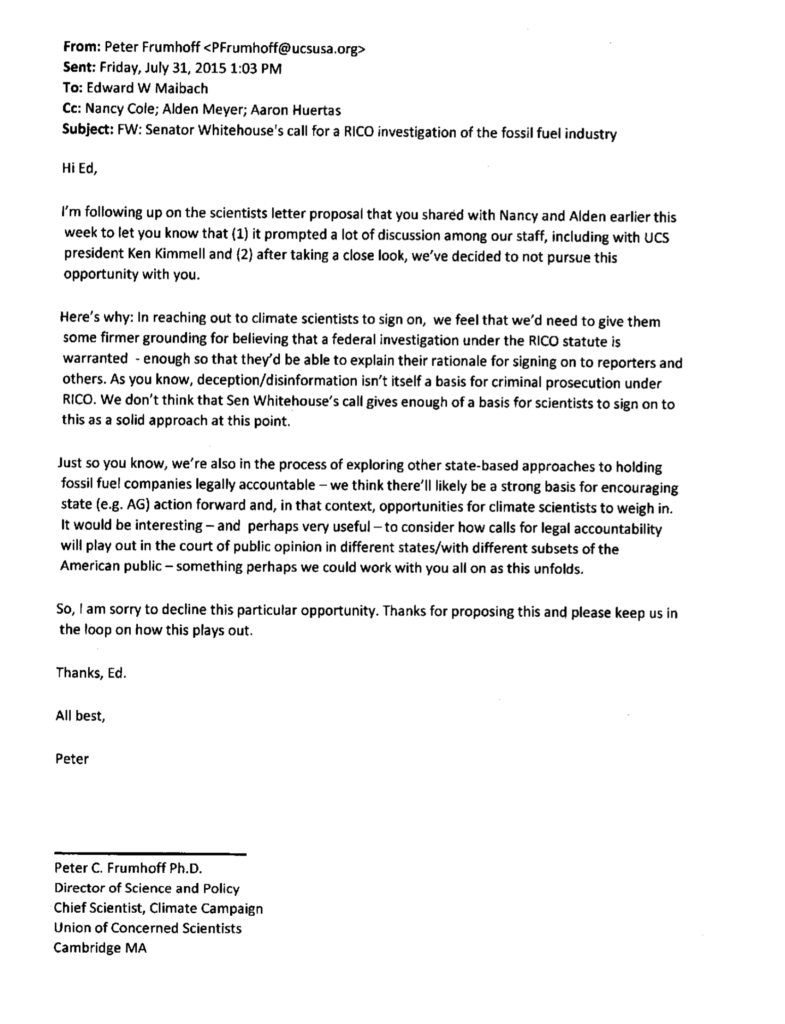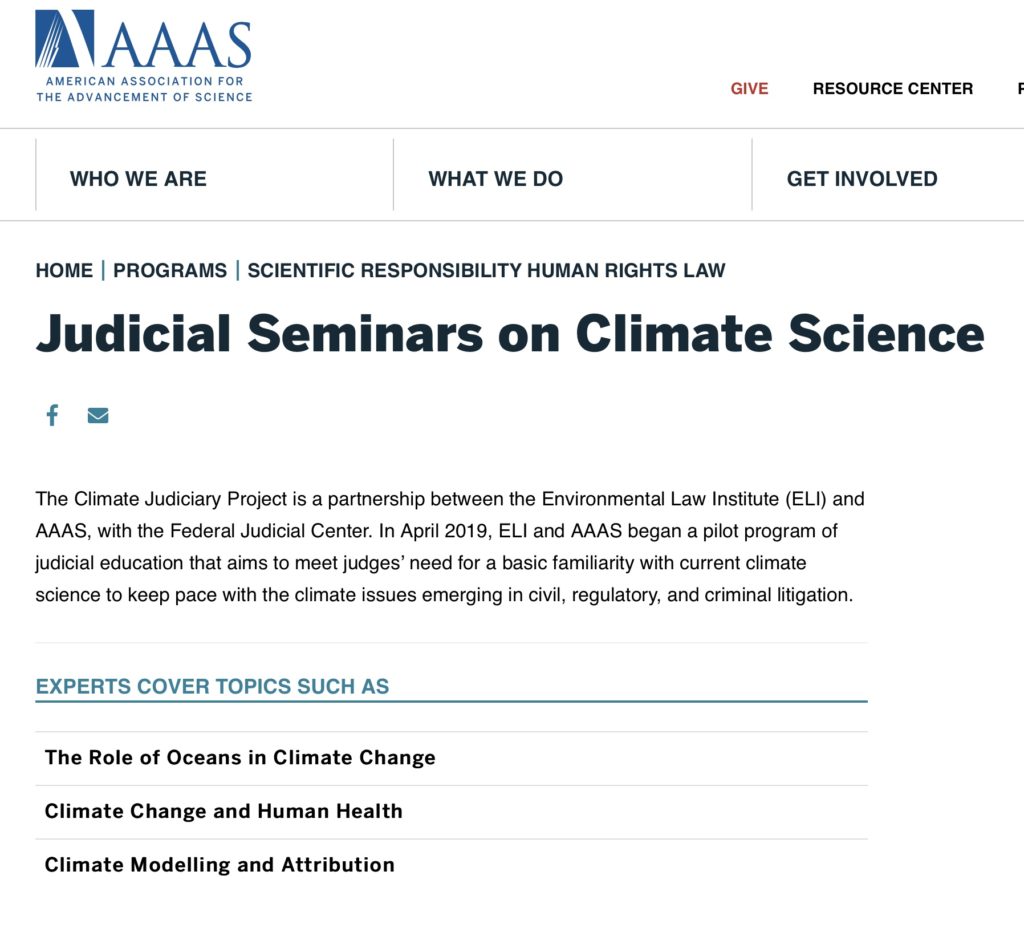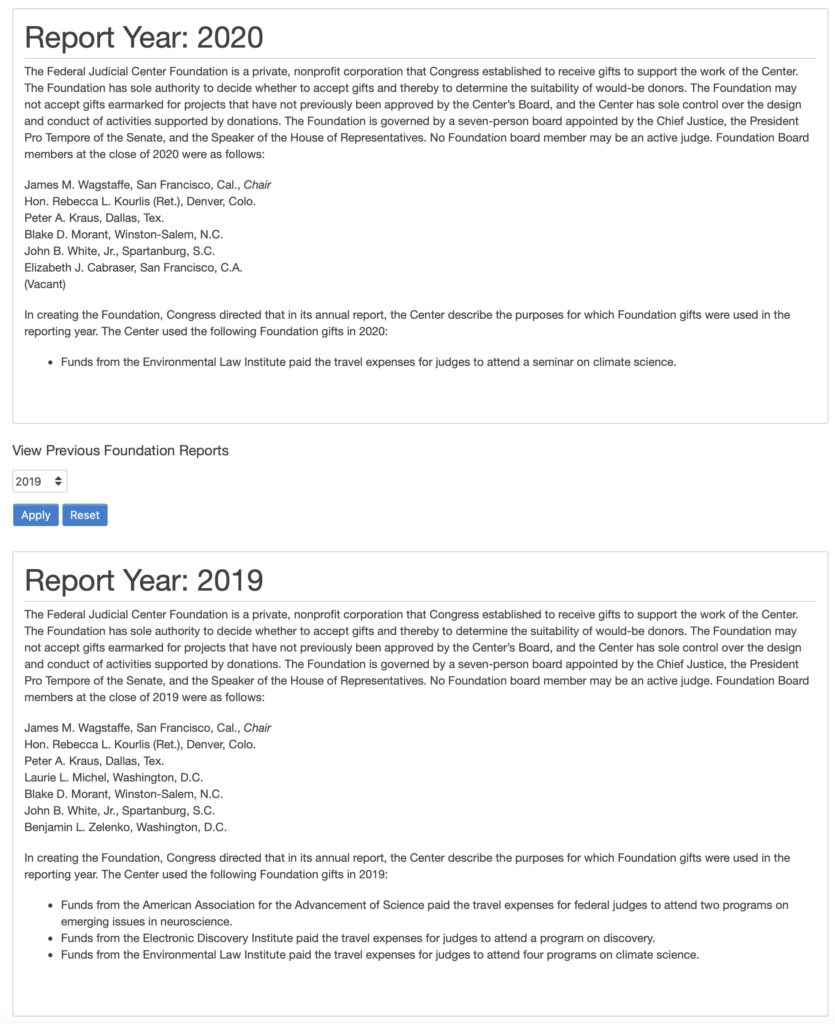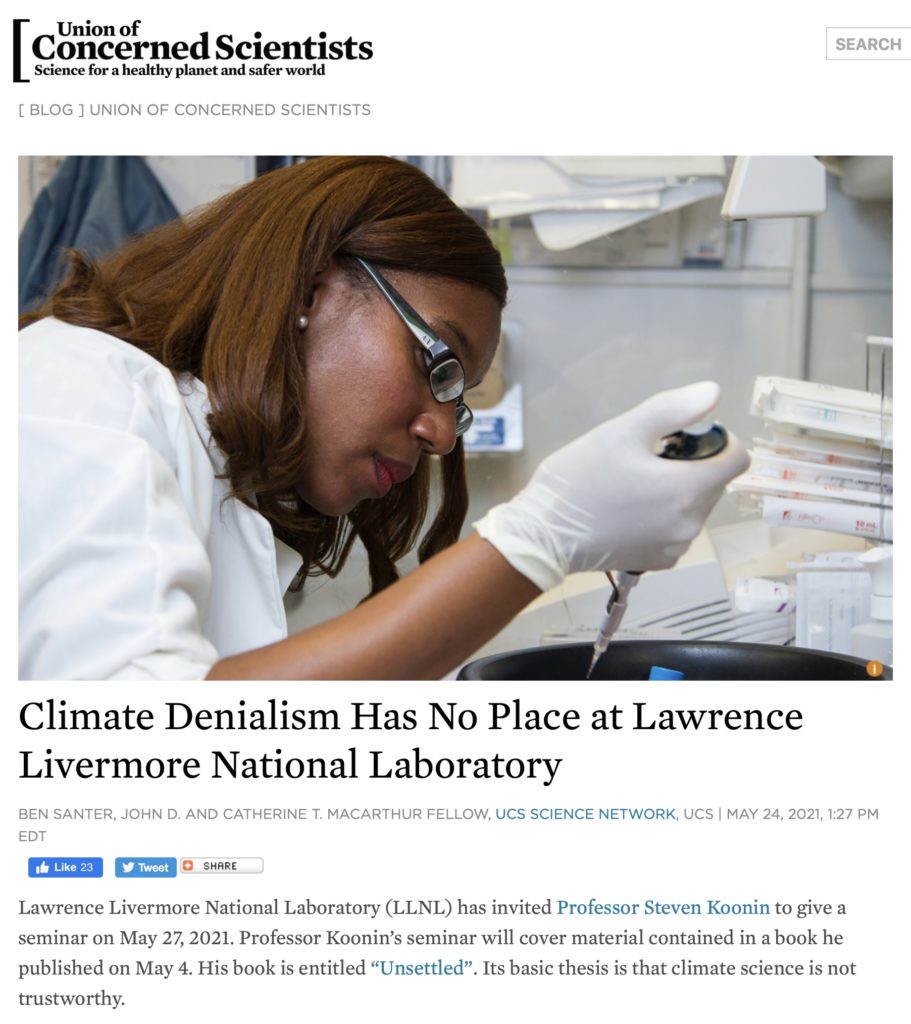More Institutions Enlisted in Climate Litigation March, Hint at Possible Climate “Criminal Litigation”
Judicial Briefings beginning in 2019 Seemingly Prompted by 2018 Federal Court Setbacks
Move to ‘Fact-Block’ What Judges Hear on “Climate” Reminiscent of Social Media’s “Fact-Checkers” Campaign
Energy Policy Advocates’s website reveals a recent Freedom of Information Act request to the Department of Energy that caught CLW’s eye. Specifically, the background included in the request established the public interest in the records for purposes of fee waiver… but also raises a few eyebrows.
It involves the wave of “climate” cases being filed nationwide. The defendants in these cases naturally and routinely remove the matter to the more appropriate federal forum. What EPA lays out is one apparent reaction of the climate litigation industry to the unnerving (to them) prospect of federal judges who conclude that their draw does indeed implicate federal jurisdiction, and keep the case, rather than send it to state courts where the plaintiffs think they stand a much better chance.
What EPA suggests is a scheme created in response to two federal judges doing just that, keeping the case, and ruling against the plaintiffs. The scheme reveals an attempt to co-opt yet another institution to try to help this novel litigation campaign remain in friendlier state courts.
EPA’s federal FOIA request asks for correspondence relating to the participation by Lawrence Livermore National Lab’s Ben Santer — a Union of Concerned Scientists Fellow who CLW readers may recall either from ClimateGate or a much more recent tantrum (see below) — in a unique February 24-25, 2021 event co-hosted by the Federal Judicial Center (FJC), a creature of Congress.

A quick reminder of UCS and its role:

It seems that the February FJC event was just the most recent among a privately financed series of sessions for federal judges, seemingly designed to supplement the “climate” plaintiffs’ legal plan and the product of some impressive establishment teamwork.
The activist, member-organization and lobbying group American Association for the Advancement of Science — AAAS having selected Washington, DC for its headquarters rather gave its game away — writes on its website:

You read that right, it wasn’t a typo:

Notwithstanding protestations by the series’ financier, the Environmental Law Institute (ELI), that it is “providing such knowledge impartially and without ideological tilt”, these sessions ensure the presentation of a carefully limited view on climate science. Indeed, it involves making the plaintiffs’ case “to judges who will be deciding these cases.” Here is how.
The co-host “The Federal Judicial Center Foundation is authorized to accept gifts to support Center programs” (https://www.fjc.gov/about); discrete programs are often specifically paid for by outside foundations. (See, e.g., https://www.fjc.gov/education/programs-and-resources-judges, https://www.fjcfoundation.org.*)
The spate of such major litigation before the courts is surely the reason behind this deployment and escalated use of FJC to reach the judiciary.**
For 2020, the year preceding the event at the core of this request, FJC only cites one private, activist group-funded event, which also was an ELI-financed “seminar on climate science.” https://www.fjcfoundation.org/page/reports. The year before that, 2019, the same activist organization, Environmental Law Institute (ELI), “paid the travel expenses for judges to attend four programs on climate science.” Id.

Out of seven total such 2019 events, four were on “climate science”, which makes five out of eight listed FJC events for those two years. That’s six of nine with the February 2021 event which, given FJC’s otherwise limited calendar of such privately financed events, does suggest an effort underway since 2019 to influence the courts on a matter now flooding the judiciary, “climate” litigation.
That presents an interesting chronology. In the Summer of 2018, the climate plaintiffs learned the hard way that leaving the adversarial process to its own devices might result in individual judges giving both sides the opportunity to introduce the court to the issue. And that did not work out for proponents of the agenda Mr. Santer so closely aligns himself with using his taxpayer-funded position.
Tis lesson came in two courtrooms, one on the East Coast and one on the West. In the latter, in City of Oakland et al. v. BP p.l.c., et al. (17-cv-06011), Federal Judge William Alsup (N.D. CA) kept the plaintiffs’ “climate” nuisance case in federal court and, after holding a day-long tutorial affording both sides to make their case, ruled that there is no federal cause of action, dismissing the plaintiffs’ suit. (See, e.g., Myles Allen, “The Alsup Aftermath,” RealClimate.org, April 25, 2018).
Within months, the Environmental Law Institute organized and financed a spate of “workshops”, working through the FJC to place before federal judges a rather more controlled presentation on the dispute. In charge of this? Paul Hanle, former president of Climate Central, which is a participant in the climate industry’s campaign to assign specific “attribution” for different weather events to, well, climate defendants.
A review of these presentations shows the group is presenting to judges the “plaintiffs’ case”, not the effort reflective of “practitioners and organizations on all sides of the political spectrum” or “providing such knowledge impartially and without ideological tilt” its financier went to such pains to proclaim, when posting an explanation for its efforts.
Although the seminars are funded, prepared, and staffed by activists presenting one side of a key issue before the courts, a quick scan of the agendas and ELI proclamations could lull a judge or others into assuming these are innocuous or even balanced. That is, until one reads the faculty bragging about how biased they are. For example:
“Santer says that during his NAS briefing, he specifically referred to the nuisance cases, which seek to recover damages from oil majors for their climate liability as well as for misleading shareholders over the risks of climate change…Santer acknowledges he is not a neutral observer in the debate and believes fossil fuel companies should be held accountable. He adds that attribution science has advanced enough ‘to pinpoint a company’s contribution . . . and assign liability based on their total contributions.’”
(Dawn Reeves, “DOE Scientist Begins Briefing Federal Judges On Climate Attribution,” Inside EPA, May 10, 2021; ellipses in original)
Santer later topped this by “ending his affiliation with [Livermore] lab over its invitation for Steven Koonin to give a seminar”. Koonin, a former Provost of CalTech, was undersecretary for science in the Obama Department of Energy (that would be Santer’s Department, which under Obama became ever more of a “climate” agency).

Santer’s activism is such that he cannot tolerate knowing that Steve Koonin was permitted to speak to fellow scientists, with his message of what the Intergovernmental Panel on Climate Change (IPCC) really says and confrontation of apocalyptic climate advocacy in science. It seems reasonable to view Santer as even less likely to participate in what ELI claims it is running, a balanced presentation to federal judges who might hear these cases.
And indeed, he did not. This most recent panel affirms the program’s bent toward presenting for judges the views of outwardly and often aggressively ‘partisan’ advocates (Santer, plaintiff’s expert Wuebbles). The other presenters included “one of the 14 scientists behind an amicus curiae brief supporting the plaintiff in the historic 2007 U.S. Supreme Court decision on carbon dioxide emissions and climate change, Commonwealth of Massachusetts, et al. v. U.S. Environmental Protection Agency”, and an academic affiliated with several openly activist groups. Again, not what ELI advertises.***
These seminars appear to represent — when viewed with the charitable grants underwriting at least one leading “climate” tort firm which has academic “experts” on retainer — yet another vehicle for activist donors to support the climate litigation industry.
The party financing these “workshops” to present to federal judges a particular point of view on “climate science” — Environmental Law Institute — has a Board populated almost exclusively by activists in the field, and a leading member of its governance team at the time of these events was one of those same donor-funded professors, UCLA’s Ann Carlson, who at the same time all of these events were arranged for also served on the same tort law firm’s team.******
Former New York Times and current City Journal science writer John Tierney describes Facebook “affiliate[ing] with a nonprofit group called Science Feedback … in what it calls a ‘fight against misinformation.’” There, as here, “[t]he group describes itself as ‘nonpartisan’… [though] The fact-checkers were actually fact-blockers. The Wall Street Journal… concluded that Science Feedback is engaging in ‘counter-opinion masquerading as fact checking’… Facebook and Science Feedback are using their “fight against misinformation” as a weapon to spread their own version of it.” This sounds familiar in the context of this campaign to educate federal judges who might hear climate cases.
It is no secret that you cannot get good decisions when the decision maker is only hearing one side of the story. The reality presented in the Summer of 2018 that federal judges might keep these cases, and — gasp — may ask to hear more than one side’s position seems to have struck a nerve with the climate litigation industry. After which, we see, yet another institution enlisted in the campaign, this time to have witnesses/potential witnesses present the plaintiffs’ case to federal judges, outside of court, about what the judges ought to think in the event the parties meet again.
- * See also, “The Board, however, acting primarily through its chair, will inform potential donors about the FJCF and the Federal Judicial Center (FJC) and its work. In this regard, Center staff should inform the Board of projects in which outside donors might have an interest and provide, to the degree practicable, the information listed in § 2.a.2.e, infra…2) The Board regards the following as helpful but non-binding, non-exclusive factors to consider in assessing whether gifts would, or would appear to, compromise of judicial branch or Judicial Center integrity and independence….e) The following factual attributes of potential donors …2. The existence of any pending major litigation before any federal court, including the nature of the claims raised and the status of the action;” https://www.fjc.gov/fjcfoundation/procedures.html (described as “For a more complete description of factors the Board considers in deciding whether to accept a gift, see the guidelines adopted by the Board.” https://www.fjc.gov/fjcfoundation/information.html).
- ** See, e.g., “In the US and around the world, there is a growing tide of litigation on climate mitigation and adaptation, climate regulation, and climate accountability matters. Judges, generalists who rarely have a background in science, are the gatekeepers of scientific evidence and in many cases the finders of fact. The Climate Judiciary Project provides the information and training needed to meet judges’ need for a basic familiarity with current climate science to keep pace with the climate issues emerging in courtrooms and the law.” https://www.eli.org/judicial-education. See also, “Over the last several years, the number of lawsuits related to effects of climate change has grown from a few major cases about a decade ago to scores of cases ranging from tort-based actions to challenges to administrative decisions within which climate implications are imbedded.” https://www.eli.org/vibrant-environment-blog/educating-judges-climate-litigation-today-and-tomorrow.
- *** A lazy rationalization by the organizers would be that, well, this *is* “the science” because defendants opted in those two cases to not present other witnesses but instead challenged the plaintiffs’ scientific claims through attorney-argument, pointing to roles played by population and economic growth and uncertainties in models and actual data (all as acknowledged even by the IPCC.) Although this approach — no doubt heavily influenced by anxious public affairs departments — prevailed before both Judges Alsup and John F. Keenan in the Southern District of New York and therefore is unlikely to change, it did not somehow lock in that ok climate science will not be contested, by these or other defendants, or amici, in the dozens of other cases.
- **** One charitable foundation, Resources Legacy Fund, has made “grants” of nearly three million dollars in just three years (2017-2018) directly to the private tort law firm leading the climate litigation campaign, Sher Edling, LLP, the one that has Profs. Carlson and Columbia’s Michael Burger on its team. Styled each year as “land or marine conservation” ($432,129 (2017) https://climatelitigationwatch.org/wp-content/uploads/2019/11/RLF-2017-990.pdf), “advancing healthy communities ($1,319,625 (2018) https://climatelitigationwatch.org/wp-content/uploads/2020/12/RLF-IRS-Final-990-12.31.18-Public-Copy-4829-6612-8044.pdf, “Land or Marine Conservation, Promotion of Education and/or Healthy Communities ($1,110,000 (2019) https://tinyurl.com/28y8pjpz), the most reasonable explanation for this is that the foundation is underwriting the firm’s aggressive pursuit of climate litigation, for which it also has lucrative contingency fee agreements under which the plaintiffs’ tort law firms receive a sliding scale of tens of millions of dollars on each tranche of hundreds of millions expected in any verdict or settlement. For example, the San Francisco agreement with the law firm Sher Edling LLP sets forth that a settlement or verdict of $100 million just for that city would yield the lawyers $25 million, which goes to $32.5 million for a settlement or verdict of $150 million, $36.25 million out of $200 million, and so on. Boulder, Colorado has agreed to pay 20% of its haul to the lawyers. Minnesota agreed to pay Sher Edling “16.67% of the first $150 million recovered, and 7.5% for any portion greater than $150 million.” https://govoversight.org/wp-content/uploads/2021/01/AGO-LAC.pdf. Add to this donor funding of universities to provide faculty to support the same firm [See, e.g., https://climatelitigationwatch.org/activists-academics-plan-legal-assaults-with-a-bunch-of-state-and-local-prosecutors-nationwide/, https://climatelitigationwatch.org/wp-content/uploads/2021/03/Carlson-Discretionary-Fund-Explainer-thread.pdf].
- ***** See, e.g., William Allison, “Bombshell: Naomi Oreskes On Retainer With Plaintiffs’ Law Firm”, Energy in Depth, May 13, 2021, https://eidclimate.org/bombshell-naomi-oreskes-on-retainer-with-plaintiffs-law-firm/, citing to, inter alia, https://www.cnn.com/2021/05/13/business/exxon-climate-change-harvard/index.html, “The company said Naomi Oreskes, one of the main authors of the study, is on retainer with a law firm that is leading lawsuits against Exxon and others in the industry. Exxon called this a ‘blatant conflict of interest.’ Oreskes was not immediately available for comment.”
- ****** UCLA Law Professor and Director of the Emmett Institute on Climate Change and the Environment at UCLA School of Law, Ann Carlson, was in late January 2021 “appointed by the Biden administration to serve as the chief counsel for the National Highway Traffic Safety Administration. The agency is in charge of climate standards for cars and trucks, which is why they have recruited me for the position.” https://climatelitigationwatch.org/wp-content/uploads/2021/05/A.Carlson-Leave-Records-21-8782.pdf. Carlson also served during this period as a consultant to Sher Edling, LLP, while also serving on ELI’s Board and governance committee. https://climatelitigationwatch.org/wp-content/uploads/2021/03/Carlson-reporting-forms-Responsive-Documents-20-8525.pdf.
